“Research has been at the heart of TC’s preeminence virtually since our founding. Not only have TC faculty and alumni produced knowledge that has contributed to the betterment of society; in many instances, their research led to the creation of new fields that revolutionized education, health, and psychology, and continue to deepen our understanding of the world.”
With those words, Susan Fuhrman set the tone for TC’s 2018 Convocation – the final one of her 12-year tenure as TC’s President – held in the Cathedral of St. John the Divine during the week of May 14th. Some 2,200 graduates participated in four ceremonies over the course of three days.
Fuhrman credited TC’s founder, Grace Hoadley Dodge, for establishing the College’s enduring commitment to research in the service of learning, research and social justice.
“If these ideas came of age in Grace Dodge’s time, they are absolutely imperative in our own,” she said. “We live in an era, first of all, when advances in understanding of learning and development are occurring almost daily – not just in schools and classrooms, but in physical rehabilitation centers, health management settings, organizations and life situations that call for adaptive responses.”
“You have been co-investigators and co-authors on groundbreaking research aimed directly at addressing the world’s most challenging problems – particularly those that fall hardest on marginalized, vulnerable, and disadvantaged citizens and populations.”
–Susan Fuhrman
Fuhrman highlighted a range of current TC research efforts that meet or exceed that standard, including the recently launched “Baby’s First Year,” a groundbreaking long-term study of the relationship between poverty and children’s brain development; the College’s multi-disciplinary Reimagining Education initiative, which is re-fashioning teaching to engage the nation’s increasingly diverse student population; the first-ever global study of how education is and isn’t being provided to some 20 million children among the global refugee population; and studies that have identified the most promising strategies to improve completion rates at community colleges.
She was quick to credit students themselves for their participation in these and other inquiries.
“All great institutions of higher learning do research,” Fuhrman told Ph.D graduates. “What sets Teachers College apart is what also sets you apart: You have been co-investigators and co-authors on groundbreaking research aimed directly at addressing the world’s most challenging problems – particularly those that fall hardest on marginalized, vulnerable, and disadvantaged citizens and populations.”
She shared the stories of several graduating students who have already made research central to their work. Among them were:
- C.J. Reilly, an Art & Art Education master’s degree student who used the 3-D printing capabilities of TC’s Myers Studio to create educational tools to help Nepalese farmers adopt best practices in tree nursery and grafting techniques. Reilly, who worked in the Peace Corps and with a Swiss development agency, has sought to enable Nepal to develop the capacity to grow macadamia nuts and compete in the world market.
- Asha Owens (Instructional Technology & Media), Rebecca Kwee (Higher & Post-Secondary Education) and Danielle Llaneza (Developmental Psychology), master’s degree students who are the developers of Best Fit, an app that enables high school students to query first-generation college-going peers about the realities of campus life. In December 2017, Best Fit won TC’s first-ever student EdTech innovation competition, and Owens, Kwee and Llaneza have since established a tech-start up to produce and market it commercially.
- Desiree Halpern, a master’s degree student in International Education Development, who wrote her thesis on how religion, culture, displacement and trauma affect the learning experiences of displaced Afghan girls. Halpern, who speaks Farsi (among several other languages), interviewed teachers and aid workers in refugee camps across Europe and then taught young Afghan women in a camp in Greece.
Inquiry for Equity
Four guest speakers, each of whom received the Teachers College Medal for Distinguished Service, took up the theme of research and gave eloquent testimony to the causes it can serve.
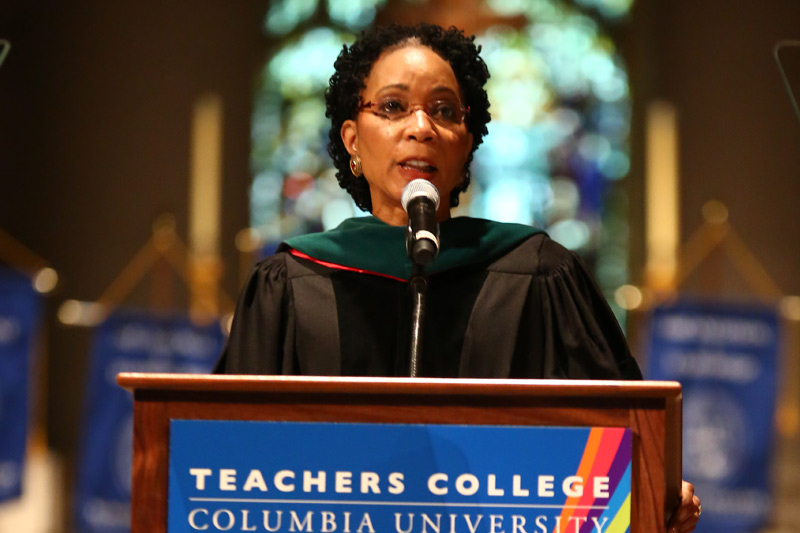
“Let your passion be your guide and let the unexpected become the expected.”
– Helene Gayle
Addressing graduates of programs in TC’s Departments of Human Development, International & Transcultural Studies, Mathematics, Science & Technology, and Organization & Leadership, Helene Gayle, a globally recognized public health expert who has been included on Forbes’ “100 Most Powerful Women” list, advised Master’s graduates to follow her lead in public health and philanthropy by “keeping a soft focus so you don’t miss what is in the periphery. Think big, think bold and believe in the possible.”
“Let your passion be your guide and let the unexpected become the expected,” said Gayle, who currently serves as President and CEO of the Chicago Community Trust.
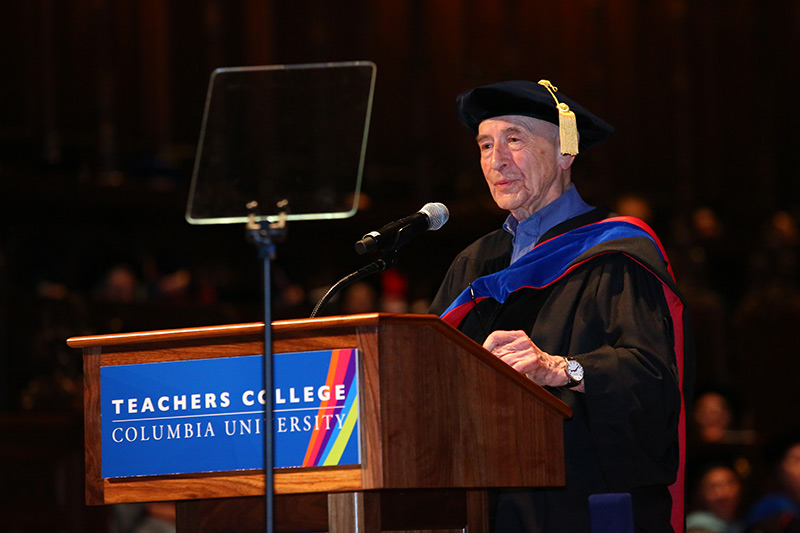
“Scientific progress has unpacked the cognitive and emotional skills that enable people to have agency, to have real choices and the chance to reach their goals and to make the most of their lives.”
– Walter Mischel
Walter Mischel, whose famous “marshmallow studies” launched a new focus on the importance of impulse control in young children, told TC doctoral graduates that his career placed him in an office “across the street” from “the oldest, and in my eyes, most distinguished teachers college in the United States.” Like Fuhrman, Mischel, Columbia University’s Niven Professor Emeritus of Humane Letters in Psychology, paid homage to TC’s rich heritage.
“The education pioneer John Dewey noted that the purpose of education is to help people realize their full potential and their ability to use their skills for the greater good,” he said. “In the century since Dewey, scientific progress has unpacked the cognitive and emotional skills that enable people to have agency, to have real choices and the chance to reach their goals and to make the most of their lives. And hopefully to make the world a better place.”
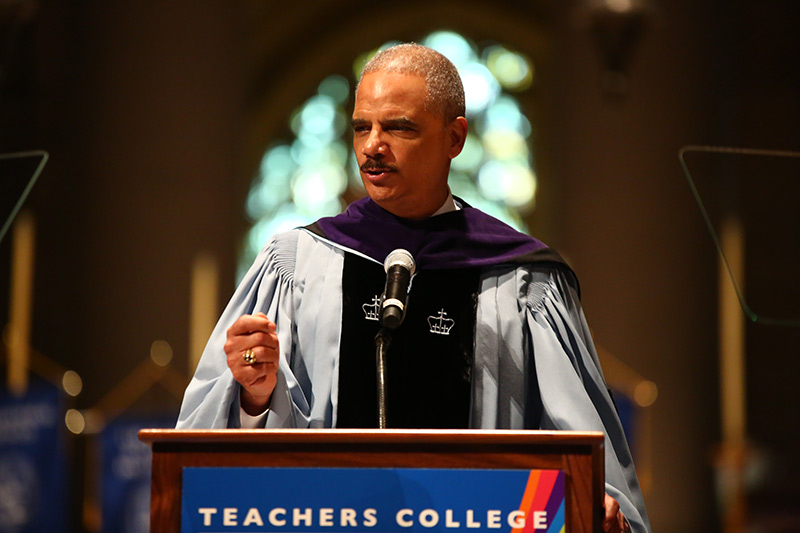
“For too long we have turned a blind eye as a nation towards the needs and frustrations of our teachers.”
– Eric Holder
In his remarks to graduates of TC’s programs in the Departments of Education Policy & Social Analysis, Biobehavioral Sciences, Health & Behavior Studies, and Counseling & Clinical Psychology Eric Holder, who, under President Obama, became the first African American to serve as U.S. Attorney General, argued that American education stands at a critical juncture. The teacher walkouts in six states rise to “the finest tradition of positive social movements,” said Holder, a Columbia University graduate who currently leads the National Democratic Redistricting Committee, adding. “The teachers are right. This must remain a movement and not just be a moment. I stand with and support those teachers in their struggle for our youth. An uncaring status quo and the politicians who comprise it will not be moved without the kind of righteous pressure that these protests represent. For too long we have turned a blind eye as a nation towards the needs and frustrations of our teachers.”
Commending the graduates for their coming service in the “undervalued” fields of learning and research, Holder said that education is “a moral imperative, a true measure of a society’s worth,” and argued that it needs to be “more than a national priority.”
But perhaps it was the journalist and historian Jelani Cobb, speaking at the ceremony for master’s degree graduates of programs in the College’s Departments of Arts & Humanities and Curriculum & Teaching, who most powerfully underscored the importance of inquiry – not only in formal research, but in dealing with situations that arise in everyday life.
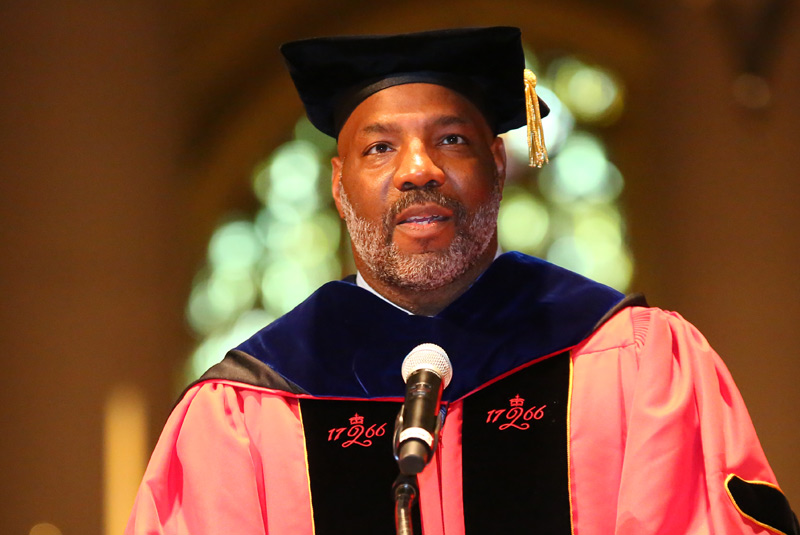
“Our schools – and our teachers – are central to this ideal of ‘we, the people’ particularly in an era where we have witnessed such an exaltation of the first person singular.”
– Jelani Cobb
Cobb, the Ira A. Lipman Professor of Journalism at Columbia Journalism School and a 2018 Pulitzer Prize finalist for his columns in The New Yorker, recalled his experience on a flight from Atlanta to New York shortly after the terrorist attacks of September 11, 2001.
Boarding the plane, he was followed by a man whose long beard and taqiyah cap “read as ‘Muslim’ in all capital letters” and was causing perceptible anxiety among everyone on board, including Cobb himself.
Cobb, feeling that he’d seen the man somewhere before, asked, “Excuse me, where are you from?”
“Where are you from?” was the mistrustful retort.
“I’m from Queens,” Cobb replied, as the other passengers looked on. “I’m asking because I think you’re also from Queens. And if you are who I think you are… we were in the same break dance crew in high school.”
When it turned out that they were, “we stood up and hugged,” Cobb told the graduates. “The people around us exhaled, clearly relieved in the assumption that no former break dancer could possibly mean them any harm.” He concluded by calling that story appropriate to the challenges facing the graduates as they prepare to enter classrooms and labs at a divisive moment in U.S. history.
“Education is called upon to stand within the breach now in a way that it seldom has been,” he said. “The roiling conflicts, the ease with which the most base instincts can be appealed to and hostilities exacerbated is stunning. Our schools – and our teachers – are central to this ideal of ‘we, the people’ particularly in an era where we have witnessed such an exaltation of the first person singular.”
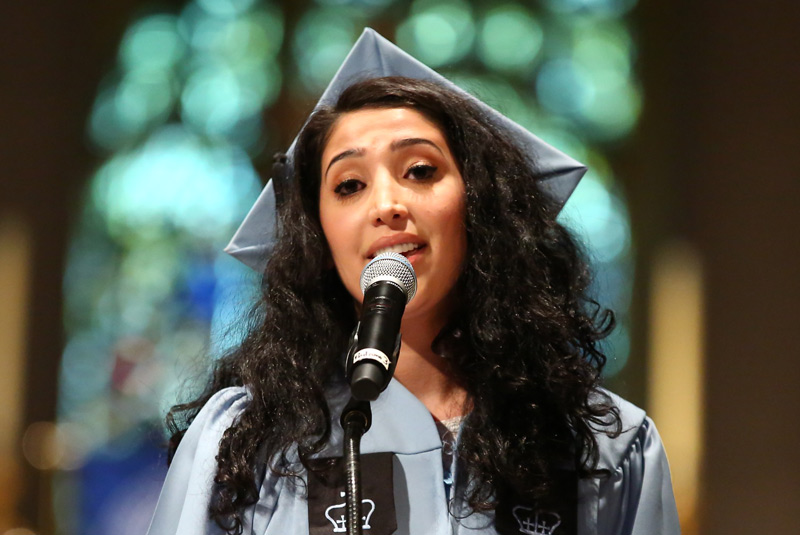
"We are loud and we are passionate educators and by speaking up our names we will go down in history.”
– Amanda Najib
Doing the Right Thing
Cobb’s words resonated powerfully with those of the TC students who spoke at Convocation.
“In these halls, in our classrooms, we have learned not to be silent – as Audrey Lorde once said: ‘Your silence won’t protect you,’” said Amanda Najib, a graduate of the Master’s program in Elementary Inclusive Education. “And, I’d add, it definitely won’t change the world. We are loud and we are passionate educators and by speaking up our names we will go down in history.”
Wale Oluwabusayomi Okerayi, a graduate of the Department of Counseling and Clinical Psychology, expressed gratitude for the “safe and welcoming spaces” of Teachers College, which gave her the opportunity to engage “in very difficult conversations about topics such as intersectional, race and gender identity and the injustices we face and see on a daily basis.”
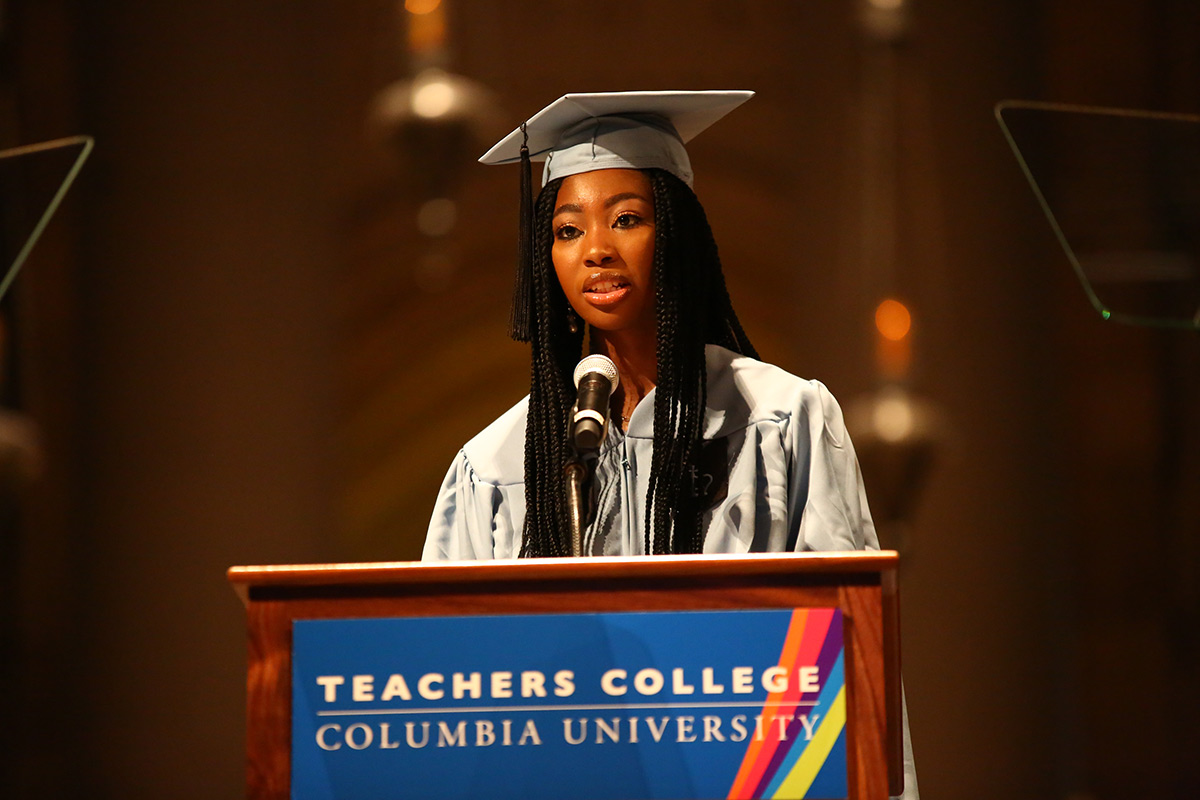
The “safe and welcoming spaces” of Teachers College created an opportunity to engage “in very difficult conversations about topics such as intersectional, race and gender identity and the injustices we face and see on a daily basis.”
– Wale Oluwabusayomi Okerayi
Those conversations, Okerayi said “helped to enhance my philosophies and solidify my goal to be a part of the movement to ending the stigma of mental health in communities of color because it is important that there are therapists that look like me in my field.”
Nathan Shields Mullen, receiving his master’s degree in International Education Development, contemplated the obligations facing his fellow graduates.
“At Teachers College, we have taken our first step in fulfilling our duty to humanity,” said Mullen, whose grandfather earned his Ph.D. from Teachers College in 1954. a degree in International Educational development & Leadership from the graduate school of education that granted his grandfather a Ph.D in 1954.
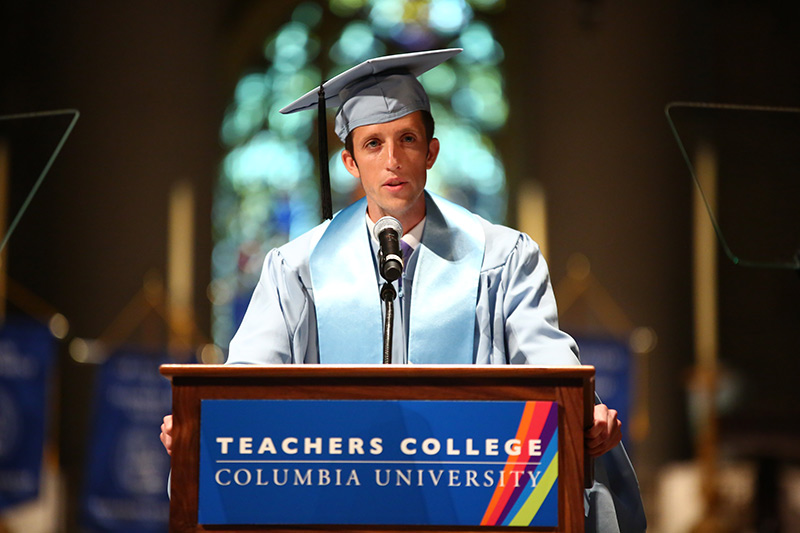
“We have ventured on a social and academic quest to answer some of our biggest questions. As a cohort of scholars we have joined the legacy of those before us. And we too are joining their ranks in becoming change makers.”
– Nathan Shields Mullen
“We have ventured on a social and academic quest to answer some of our biggest questions. As a cohort of scholars we have joined the legacy of those before us. And we too are joining their ranks in becoming change makers… it takes courage to do the right thing: to enter a new school, a new office, or a new country, and to stand up for your beliefs; but if a group of high school students from Parkland Florida have the courage to stand up to a nation and change the discourse around gun violence – then we, as graduates at one of the most forward-thinking graduate schools in the world, have a duty to do so.”
Related Stories: